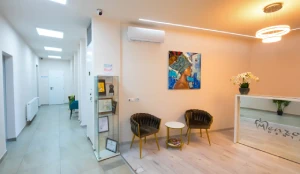Dear Patients, We would like to inform you that our clinic will be closed for vacation between August 18 and 22, 2025.

The implantation is artificial root made of titanium that is for the replacement of the lost tooth or teeth. Today’s widespread form is screw or stepped cylinder. The material is pure titanium and its surface is specially made to integrate into the bones and to be connected to the soft tissue.
What are the advantages of implant dentures?
-In those cases where only one or two teeth are missing it is not necessary to skive the healthy teeth to create the bridge.
-In case of missing back teeth instead of removable prosthesis, fixed supplement can be made i.e bridge, which is more comfortable than the removable prosthesis.
-In case of full teeth loss, that kind of prosthesis can be made with small number of impants, that will not move during chewing or speech. Depending on the state of the edentulous jawbone, the missing teeth can be replaced by bridge with more implants.
-It prevents the inevitable bone resorption after tooth loss
-It makes easier to maintain social relationships by giving sense of security and comfort during chewing and speaking.
What materials are implants made of?
Into the body only those kind of materials are placed in, which does not cause any harm, the tissues tolare it and not eject it. These materials are called “bio-materials” such titanium materials from which the implants are made of. Hip prostheses are made of titanium as well. The shape of the dental implants are usually cylinder or screw. Certain products’ surface is covered by tissue-friendly material which helps the fast incorporation into the bone.
Who can have implant?
Those patients are suitable for implantation who are in good health, good oral hygiene and have enough bone. During the preliminary tests, the doctor informs the patient about treatment and surgical procedures, as well as denture design.
What are the risks of implant surgery?
The implant surgery happens under local anesthesia, the complications of this is like any anesthesia. Of course, these can be prevented with the right wariness. During the surgery the surrounding structures (sinus opening up, nerve injury) can be damaged, but with careful planning and good surgical technique, this is avoided. The rejection of the implant is extremly rare. In case of good oral hygiene and regular monitoring the chance of it is very small.
How are the implants are implanted?
The implant requires an especially careful planning and implementation from the dentist and dental technician. The doctor first will be informed of the general state, diseases and medicines of the patients. This will be followed by a thorough dental examination. In every case X-rays will be made, and if it necessary, three-dimensional CT image as well. After mucosal cutting the jawbone will be released and there will be a a suitable location for the implant where the artificial root will be placed and the wound will be sewed. So the implant covered like this heals for 3-6 months and during this the implant “ossifies” (the bone grows on the implant thus it will be locked). During the period of the healing a temporary prosthesis can be worn. After surgery, a smaller facial swelling may occur, but no need to be afraid of more pain. After the healing making a very small cutting on the mucosal the implant will be released, and a gum shaper screw will be placed in. After a short time comes the impression, based on which the dental technician makes samples and prepare a prosthesis. And it is the dentist responsibility to place the dental work in the mouth.
How long does the whole procedure take?
The duration depends on the number of implants and the necessity of bone structure. In most cases, when only one tooth is involved, the procedure takes only one hour.
Do I remain toothless after the implantation?
If the implant will be placed in the front part of the mouth the dentist will make you a temporary denture or bridge not to remain toothless. In case you have a full plastic denture, you can wear it during the whole time of the healing period after it is transformed.
Important information after the implantation surgery:
Place ice packs outside the surgical area to reduce swelling. Do not eat until the anesthetic takes its effect. Do not drink coffee, tea, alcohol, do not smoke or eat spicy foods for one day. Pay attention to the oral hygiene , brush your teeth – except for the area around the implant – properly but including the wound , and gargle with an antiseptic solution according to directions. Take the recommended medications. Take pain killers as needed. The sutures are removed in 7-10 days.
How to look after the implants?
Just like like natural teeth, ie brushing and with dental floss 2x daily. Using the dental floss and teeth brushing is very important. Also pay attention to the importance of the regular dental control.

Passing through the Széll Kálmán square, you can leave your car in the Mammut shopping center, just a few minutes walk through Ostrom Street.
To Széll Kálmán square with trams 4 and 6 and metro 2. Go on Ostrom Street, then turn right and walk along Lovas Road, which will see Swan Street (about 450 meters, 5 minutes walk)
Temps de remplissage du formulaire : 1 minute
(La radiographie panoramique est importante pour l’établissement d’un devis!)
Vous souhaitez retrouver votre sourire avec une équipe professionnelle?
Remplissez notre formulaire sans aucun engagement afin que nos collègues experts dans ce domaine puissent vous étabir un devis gratuit et par la suite vous aider à résoudre vos problèmes dentaires le plus rapidement possible.